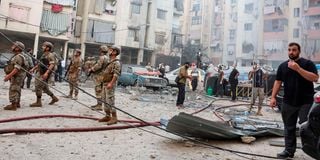
People and members of the military inspect the site of an Israeli strike in the southern suburbs of Beirut, Lebanon, September 20, 2024.
Hundreds of Kenyans are currently stranded in Lebanon, feeling abandoned as a violent conflict escalates in the region between Israel and the militant group Hezbollah.
Their story of fear amid hellish bombing and gunfire has become a constant reminder of how far they are from the safety of home. But it also pokes holes in the government's strategy of sending workers abroad with no safeguards when those countries become war zones.
On Thursday, the government insisted that all Kenyans in Lebanon were safe, but did not clarify whether there were plans to evacuate them or at least relocate them to safer parts of Lebanon.
Halima Mohamud, Kenya's non-resident Ambassador to Lebanon, who is based in Kuwait, told the Nation that the embassy was in touch with all Kenyans stranded in Lebanon and that they had been given information on who to call in case of danger.
“No Kenyan has died or been injured. We are in communication with them,” she said. “We have a hotline number and we are ready to assist any time 24 hours.”
But those stranded in Lebanon tell a different story. They say they provided the necessary information but haven't heard from the authorities since.
Those trapped are migrant workers, mostly women, who came to Lebanon to work in the domestic and hospitality sectors. According to the Ministry of Foreign and Diaspora Affairs, there are at least 26,599 Kenyans in Lebanon. In October last year, 1,500 Kenyans were placed in jobs in Lebanon as part of an agreement between various agencies and the Kenya National Chamber of Commerce and Industry (KNCCI).
“I came here last year, filled with hope, believing I’d find greener pastures. But now, this place has become my living nightmare.
“It’s as if our government has abandoned us, leaving us feeling like we don’t even belong—like we are invisible, forgotten. We try to hold on, but every day is harder than the last. Bombs are falling everywhere; the air is filled with the constant sound of destruction. Just yesterday, one exploded so close to my home that the entire building shook. I live in constant fear, waiting for death to come for me, but I don’t want to die. I don’t want to die,” said Sharon Akinyi, 31, a caregiver.
The bombings began last week as Israel launched offensives against Hezbollah, which it accuses of terrorising residents near the border with Lebanon. Hezbollah is allied to the Hamas militant group in Gaza, with which Israel has been at war for a year, after the militant group launched an unprecedented attack on Israel in October 2023.
At least 400 people have been killed in Lebanon since the offensives began. Some Kenyans claimed that their employers had locked up their travel documents as they fled the bombed areas, leaving them vulnerable to the shelling.
But this conflict has been on the horizon since January. In July, the government in Nairobi had even asked Kenyans to fill in a form with detailed information, including their addresses and telephone contacts.
“Months have passed, and it feels like we've been forgotten. No updates, no news—just silence.
“It’s like we’re invisible. How can they send us a link and then leave us here, stranded and scared? Nobody is saying anything, and it makes me feel so abandoned. Some girls are still arriving here, completely unaware of what they’re walking into. How is that even possible? How can they let people come into a war zone without warning?” said Alice Kalekye, who works as a caregiver in Beirut.
The Kenyans described the harrowing reality of living in a war zone, with the sounds of bombs and gunfire becoming a constant backdrop. As other countries evacuate their citizens, Kenyans feel abandoned and are pleading with the government to step in and help them.
“I’m traumatised. I can’t sleep, I have no appetite, and every day feels heavier than the last. We’ve tried reaching out to the agents back home, begging for help, but they push us off to the agents here in Lebanon. These agents demand $200 just to let us leave. Some of us have food, but many don’t. Some are starving, with no access to anything,” said Vionah Kerubo a house manager.
“We need help. We are not safe, and time is running out. We cannot continue living like this. Someone has to listen. But no one is talking about us—the migrant workers, locked away in houses, with no help, no protection. It’s terrifying to know that your own government is silent, that the agents who sent you here are still sending more girls into this nightmare. How much longer do we have to wait before someone steps in?” said Ms Kerubo.
These workers spoke to the Nation on a conference call.
Some of the stranded Kenyans workers worry about their families back home, trying to shield them from the truth of their plight while struggling with their own fear and anxiety.
“The situation here is beyond terrible. Every day feels like a nightmare we cannot wake up from. We have been praying, begging our government to come to our aid, but our cries seem to fall [on deaf ears]. The fighting started in the south, and we had hoped those caught there would be rescued, but nothing happened. They fled to the north, where I am now, only for this side to be consumed by the same horrors,” said Anne Ngugi, a house manager.
Mary Kamau spoke of feeling trapped, her passport held hostage by her employer. She longs to return home and be reunited with her family. Now every moment feels like an eternity of anguish, a relentless reminder of their vulnerability.
“We feel trapped, unable to escape. Our passports, held by our employers, are our only way out, but they refuse to release them. We are desperate. We beg for help. We are pleading with our government, with anyone who can hear us—please help us return home,” said Ms Kamau.
Another Kenyan, Sheila Saduka, said, “We came here because there were no opportunities in Kenya, but this... this is not safe. Yesterday, we didn’t even sleep in the house. It's worse now, much worse. My stomach knots every time I hear the sound of bombs or gunfire. The planes circle endlessly above us. I just wanted to provide for my family, to give them a better life, but it’s not safe anymore. My parents are worried sick, but I keep lying to them, telling them everything’s okay. It’s not. Nothing is okay. I’m scared. I want to come home. Where is our government? Why is there no help? We don’t even have an office here to turn to. We cannot die here, not like this.”
Purity Mogunde, another migrant worker, said her once-promising journey had turned into a harrowing ordeal. With each passing day, the sound of war comes closer, drowning out any hope of normalcy.
She says they are haunted by the thought of their families back home, praying for their safety while living in a state of perpetual uncertainty.
“I've been working in Lebanon for five months now. We were staying in Faraya Mountain, but the situation has deteriorated significantly. We can't sleep because of the constant sound of explosions all day and night. We urgently appeal to our government to help us get out of here.
“Our employers are refusing to give us our passports, and we lack any travel documents. Please, we implore our government to take action,” she said.
The ongoing conflict between Israel and Hezbollah has turned southern Lebanon into a battlefield, raising fears that the whole country could soon become embroiled in a wider regional war. What started as daily exchanges of fire following Hamas attacks on Israel last year has now evolved into a deadly struggle between Israel and the Iran-backed Hezbollah.









